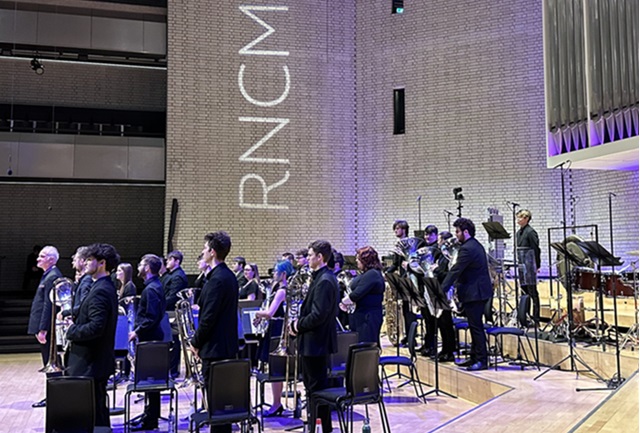

Conductors: James Gourlay, Dr David Thornton, Benjamin Voce
Soloist: Gary Curtin
Featuring: Rosamund Brass Quintet
Presenters: Simone Rebello, Emily Nicolas
RNCM International Brass band Festival
Sunday 28th January
Over the past 20 years and more the RNCM Brass Band has brought a defined sense of student radicalism to its home festival.
Led by conductors from Howard Snell and Elgar Howarth on, it has been a performance study list that has included works by Souster, Holloway, Birtwistle, Higgins, Wilson, Gorb, Aagaard-Nilsen, Part, Carpenter, Pankhurst, Payne and many more.
Radical spirit
This year saw an exploration of compositional borders, both geographical and interpretive.
Each was delivered with mature insight under a trio of intrepid conductors – opening with the robust colourings of ‘Gran Fanfaria’ by Giancarlo Castro D’Addona, energised by James Gourlay, who certainly remains an unashamedly radical musical spirit.
It was followed by ‘Requiescat Aberfan’, a deeply personal reflection on the incomprehensible loss of young life in the 1966 Aberfan disaster. Martin Ellerby’s work, a tender prayer for restful peace, was performed with the most mature understanding of the tragic human cost of mining coal.
Primal urges
Tom Harold's 'Deep Surge' was recorded by Gary Curtin in 2020 but was given its first public performance. Both composer and performer are former RNCM alumni who have gone on to make their global mark.
It is a battle of wills; the uber-aggressive percussion led ensemble raining hammer blows at the soloist who skilfully weaved out of trouble like a cornered boxer to counterattack with rapier jabs.
It is a battle of wills; the uber-aggressive percussion led ensemble raining hammer blows at the soloist who skilfully weaved out of trouble like a cornered boxer to counterattack with rapier jabs.
Curtain was tested to the core in a remarkable triumph - the tension never loosened, even in a central chorale of temporary exhaustion that was merely a prelude to another series of primal destructive urges before delivering the terminal blow to his ensemble rival.
Different tensions
Dorothy Gates’ ‘Another World - Concerto for Brass Quintet and Brass Band’ brought tensions of a different kind - a triptych of playful rather than overtly aggressive conversations that bounced off the ensemble rather battling against it – the quintet (with James Gourlay on tuba) precise and cohesive throughout.
The beautiful, yet treacherous connections between isolated communities in the high Swiss Alps was explored with sure footedness by conductor Benjamin Voce in Oliver Waespi’s ‘Traversada’.
The tracks have also offered a natural means of protection for a linguistic and cultural identity under increasing threat – the echoes of local folk songs and communication calls becoming ever more distant and redundant as the modern world has encroached.
The tracks have also offered a natural means of protection for a linguistic and cultural identity under increasing threat – the echoes of local folk songs and communication calls becoming ever more distant and redundant as the modern world has encroached.
To round off a fine concert – also aided by presenters Simone Rebello and Emily Nicolas - James Gourlay returned to lead an exciting rendition of Pimpanit Karoonyavanich’s ‘A Journey to the Bermuda Triangle’.
Inspired not by modern day conspiracy theories, but by a romantic seascape painting by Belgian artist Romain Steppe, it mixed stark reality with questioning fable throughout its four connected movements.
Malcolm Wood









